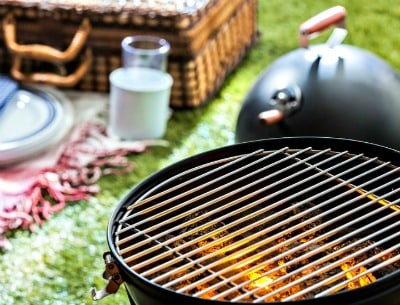Tips to Keep Your Summer Fireworks, Pool Parties and Grills Under Control
The Fourth of July is nearly upon us and for many it’s the best time of the summer. School is out, barbecues abound and vacations fill the coming weeks. But celebrating the Fourth is not without its perils. Thunderstorms, extreme temperatures and mishandled fireworks can wreak havoc on your outdoor celebrations and beach trips.
So, here’s how you can stay safe this holiday and reduce your risk of accidents and injuries.
Playing with fire
Fireworks are part of America’s DNA. Celebrations heat up weeks before the Fourth of July and the festivities often extend throughout the summer. Unfortunately, fun sometimes comes at a high price. Approximately 13,000 Americans were injured in fireworks-related incidents in 2017 according to the U.S. Consumer Product Safety Commission (CPSC).
Your property is also at risk. A misdirected flare can cause a fire to your home or a nearby structure.
“As long as the community complies with legal safety standards, fireworks can be a safe, enjoyable and family-friendly entertainment experience,” says Julie L. Heckman, executive director of the American Pyrotechnics Association (APA).

Legislators agree. As of May, only one state — Massachusetts — continue to ban all consumer fireworks according to the APA.
According to Heckman, industry revenue for 2017 was $1.2 billion with consumer fireworks revenues representing $885 million of that figure. “We anticipate 2018 revenues will continue to surge with the continued relaxation of State and local fireworks laws,” Heckman says.
 Chances are that fireworks are legal in your state, but not necessarily all types. Make sure to check your homeowners or renters insurance policy as well as your state and local laws. Homeowners will not receive coverage if a firework-related fire happens in states that prohibit the type of fireworks that caused the damage.
Chances are that fireworks are legal in your state, but not necessarily all types. Make sure to check your homeowners or renters insurance policy as well as your state and local laws. Homeowners will not receive coverage if a firework-related fire happens in states that prohibit the type of fireworks that caused the damage.
The CPSC publishes important safety tips to prevent injuries.
Grilling — Another one of America’s favorite pastimes during the summer is hosting backyard barbecues.
According to the latest National Fire Protection Association (NFPA) report, firefighters responded to an average of 9,600 home fires involving grills, hibachis, or barbecues between 2011-2015. The report also reveals that gas-fueled grills caused the majority of fires.
Your homeowners insurance policy typically covers you if your backyard grill accidentally sets fire to your property, such as your house or garage.
Coverage usually includes liability protection should a guest suffer burns or injury from your grill. But be prepared to pay your deductible first.
NFPA publishes the following safety tips for grilling.
Making a splash
Swimming pools can provide endless hours of fun for kids and relaxation for adults. They can also be deadly. From Memorial Day through Labor Day 2017, at least 163 children under age 15 fatally drowned in swimming pools or spas according to the USA Swimming Foundation.
Rachel Griffiths, communications director at Aquatic Safety Research Group (ASRG), says the key to backyard pool safety is layers of protection.
“Aquatic Safety Research Group strongly believes in our concept of Note & Float — identifying if children can comfortably and competently swim (‘note’ with a wristband) and requiring those who can’t yet ‘float’ in properly-fitting United States Coast Guard approved life jackets,” Griffiths says.

Pools are considered an “attractive nuisance,” meaning the owner of the pool is liable for anyone who uses it, invited or not. Though most liability provided by homeowner’s insurance policies covers pool-related incidents, the standard amount of liability protection — approximately $100,000 — may not be sufficient. This is particularly the case if you are hit with a lawsuit for the death of a child, for example. Purchasing a separate umbrella policy is the best way to increase your coverage.
The American Red Cross publishes Home Pool Safety tips on how to keep children safer in and around water. But enclosures are not enough according to expert like Griffiths.
“Drowning can happen quickly and quietly, usually with no verbal calls for help,” Griffiths says. “In addition to barriers, children should have supervision when using the pool at all times.”
Boating — Whether fishing, skiing on the lake, or just taking a relaxing jaunt up the coast, boating presents an increased risk of negligence. As a boat owner, you are liable for any injuries as a result of a collision with another boat or land, or if you don’t provide proper safety equipment. Unfortunately, automobile insurance will not cover you. Check with your homeowners insurance policy to see if it covers boating accidents (some actually do) and if it doesn’t, you will want to purchase boater’s insurance.
Weathering the summer storms
You can expect an average hurricane season for 2019. The National Oceanic and Atmospheric Administration recently released it forecast. They are predicting nine to 15 named storms, with between four and eight of them becoming hurricanes. Two to four of those named storms may evolve into major hurricanes.
Regardless, a storm is still a storm so be prepared.
“Preparing ahead of a disaster is the responsibility of all levels of government, the private sector, and the public,” says Daniel Kaniewski, FEMA deputy administrator for resilience. “It only takes one event to devastate a community so now is the time to prepare. Do you have cash on hand? Do you have adequate insurance, including flood insurance? Does your family have communication and evacuation plans?”
These are all good questions you should have answers to before you hit the beach.
Even if you don’t live along the coast, you can expect property, theft and accident insurance claims to be on the rise.
Theft and vandalism — As the temperature heats up, so do the chances people will venture outside – and often for no good.
Frank Scafidi, spokesman for the National Insurance Crime Bureau (NCBI), says July and August are the top two months for vehicle thefts. “Thieves like warm weather and many people leave their cars unlocked with the windows down or leave them running with the keys inside and the air conditioning on,” Scafidi says. “Those make easy targets for opportunistic thieves.”
To minimize auto theft, the NCBI recommends using “layered protection” measures.
Tire Blowouts — Tire Safety Week 2018 has passed, but the risk of a blowout hasn’t. With two-thirds of families who are planning a family trip this year traveling by road according to AAA, you’ll want to use these tire maintenance tips to keep your tire round and durable.
Broken Windshields — You’re not the only one that bakes in your car during a heat wave. Your windshield does,too. As the sun heats up the metal, it also puts your windshield at risk of cracking easier. Your windshield is also vulnerable to stray neighborhood baseballs and rocks that get kicked up from the truck in front of you on the highway. Parking in the shade or a garage or using car covers can help keep your windshield stay in one piece.
Driving while sleeping — According to the National Sleep Foundation, drowsy driving can be even more dangerous than driving while intoxicated. The best line of attack if you feel drowsy while driving alone? Pull over (safely please) and take a 20-minute nap. Caffeine works wonders, too.
Editor’s Note: This is an updated version of an article originally published in May 2018.
